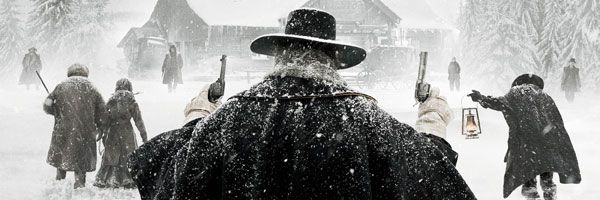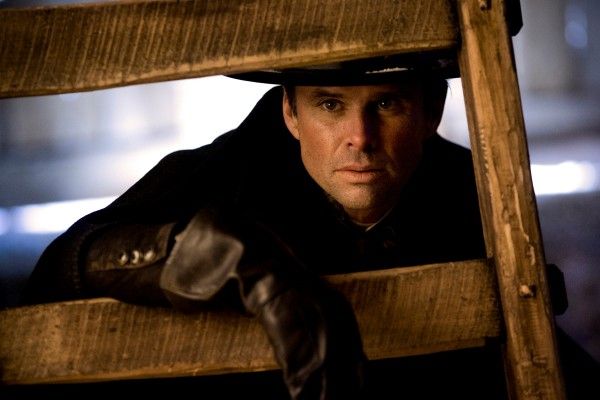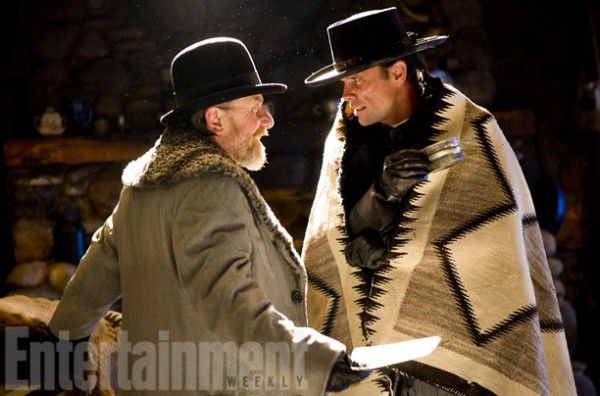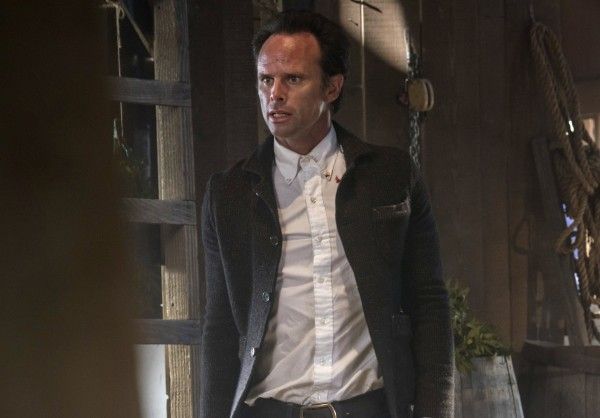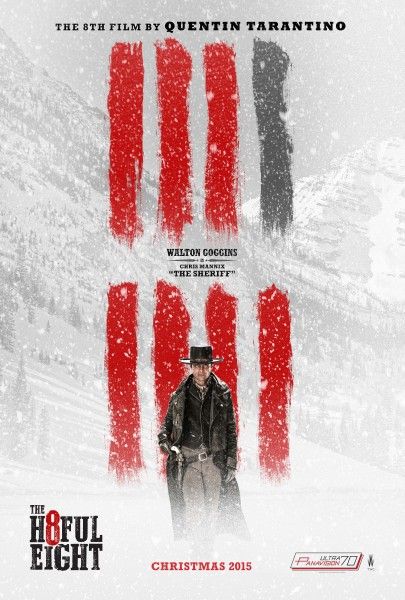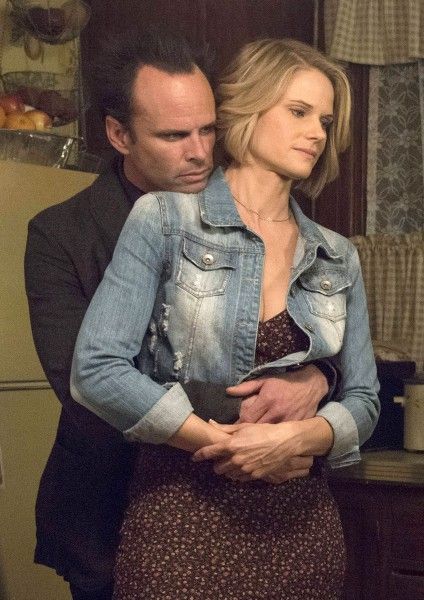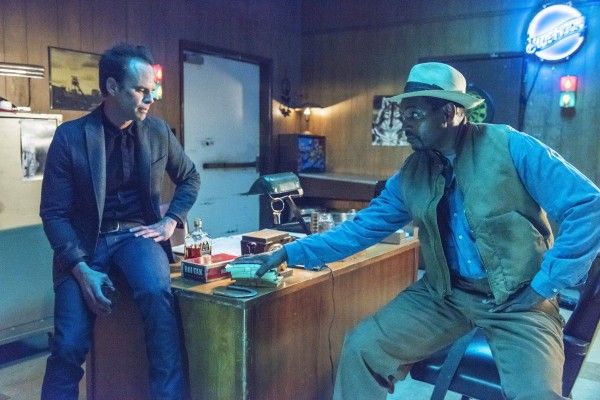In Quentin Tarantino’s western The Hateful Eight, actor Walton Goggins plays Chris Mannix, a southern renegade who claims to be the new Sheriff of Red Rock. On his wintery journey, he comes across bounty hunter John Ruth (Kurt Russell), who is taking fugitive Daisy Domergue (Jennifer Jason Leigh) to justice, and black former union soldier turned bounty hunter Major Marquis Warren (Samuel L. Jackson). Together, they stop off at Minnie’s Haberdashery to seek refuge from an oncoming blizzard, and they cross paths with a handful of strangers with questionable intent, quickly proving that the blizzard may be the least of their problems.
At the film’s press day, Walton Goggins (Justified, The Shield) spoke to Collider for this exclusive interview about getting the phone call from Quentin Tarantino to be in The Hateful Eight, being a part of the Tarantino alumni now, why shooting inside of Minnie’s Haberdashery was similar to doing a play, soaking up every moment of the experience, and what makes working with Tarantino so special. He also talked about how happy he is with the way his FX series Justified ended (the final episode aired on April 14, 2015) and that he wouldn’t have changed a thing, and how excited he is for people to see his upcoming TV series, the HBO comedy Vice Principals, from Danny McBride and Jody Hill.
Collider: After having spoken to you about every season of Justified, it feels a little weird to be talking to you about something else.
WALTON GOGGINS: It is a little weird to be talking about something else. Although it’s going from Elmore Leonard into the imagination of Quentin Tarantino, and Quentin is a big fan and admire of Elmore and Elmore has been a big influence on Quentin. And I’ve been loquacious in both. Another gift that Quentin has given me is the opportunity to make the ending of Justified that much more palatable, to cushion that fall that inevitably comes at the end of an experience that affects you, the way that Justified affected me.
Were you happy with how everything ultimately ended with Justified?
GOGGINS: I was so happy. I wouldn’t change a word. Graham Yost wrote that final scene between Tim [Olyphant] and I, or between Raylan and Boyd, in an hour during his first sitting. I think that was his first pass at it, and that was the pass that we used because it was so good. If Graham were sitting here, he would say the same thing, that when you’re in that pocket, it no longer just belongs to you. It belongs to the universe, nature and all things, or whatever deity you believe in. It’s divinely led. That’s how I feel about it. And I’m grateful to be sitting here now, talking to you about [The Hateful Eight].
And you are just so good in The Hateful Eight.
GOGGINS: Thank you for saying that! Thank you very much for saying that. First and foremost, when you get the call from Quentin Tarantino, it’s the call of a lifetime. You don’t allow yourself to be vulnerable enough or to be fool enough to expect that phone call to happen, in reality. There’s not an actor that I know, worth their weight in salt, who hasn’t secretly, when no one is looking in the car, said their Emmy speech or their Oscar speech because you don’t want to fuck that up. So maybe when you’re alone or no one’s looking, you dare to think, “Maybe someday I could get to work with somebody like Quentin Tarantino.” For me, it happened. And it didn’t just happen once, it’s happened twice.
Once he does make that phone call, Quentin Tarantino likes to use a lot of the same actors, over and over again.
GOGGINS: Yeah, he does. And to see that play out and witness that firsthand, and to see his relationship to Tim [Roth] and Michael Madsen, who were there from the beginning, versus his relationship with Sam Jackson, who is, for all intents and purposes, Mr. Quentin Tarantino, he’s the guy who’s his muse. Tarantino and Jackson is like Scorsese and DeNiro, and their silent communication. And then, there’s Kurt Russell, who has worked with Sam before. And I got a chance to work with Quentin on Django, as did Bruce Dern. And then, I got to see Jennifer Jason Leigh and Demian [Bichir] and their first interactions and their taste of it, and watch them just blossom in the world that he creates. Man, what a ticket to the show.
The ensemble scenes inside of Minnie’s Haberdashery are reminiscent of the ensemble scenes in Reservoir Dogs.
GOGGINS: You know, I don’t know that it’s happened since Reservoir Dogs that these characters that belong to pop culture and cinema legend, in some ways, from Tarantino’s imagination get to interact, all at the same time. It hasn’t happened since Reservoir Dogs, but we want them to. You like at Jules (from Pulp Fiction) and you wonder, “What would he be like with this person?” But in this movie, the entire film is the diner scene in Reservoir Dogs. We’re all there, at the same time, and we get to watch each other step to the front. It really is like a play, in the sense that we’re all talking, and then all the lights go down on all of us except for one. And that particular day, the rest of us who are in the dark just have our hands to our face saying, “Look at her go,” or “Look at him go.” And then, it’s inevitably your turn. For me, when it was my turn, I can’t tell you what it was like to have Sam [Jackson] and Jennifer [Jason Leigh] and Demian [Bichir] and Bruce [Dern] and Michael [Madsen] and Tim [Roth] behind me. Those motherfuckers were behind me when the light was on me. It was incredible!
Does it feel different when you’re no longer the new guy, and you’re now one of the Tarantino alumni? Do you feel more confident, or like you have more freedom?
GOGGINS: Confidence is a good word. You don’t start your first day as your own worst enemy. The anxiety and the fear of fucking it up, and the great unknown that is and can be paralyzing, I didn’t have coming into it the second time. Maybe it’s like having your second child, in some ways. I’m not going to get through this period. I’m going to soak up every moment of this period. That’s what it’s like working with Quentin, the second time around. There’s not an obstacle, element of nature, something to overcome that you take for granted. You’re just like, “Bring it on! Let me have it! Put it in my face! Tell me what mountain to climb, boss!” You relish every step.
Quentin Tarantino has such a passion for films and filmmaking that that must also be infectious when you’re working with him.
GOGGINS: He has many different traditions he’s created over the years, and a lot of them have been there from the beginning. One in particular that binds people together is whenever he does a take of something and he has it, and we all know what we just witnessed, Quentin will say, “We’ve got it, but we’re gonna do it one more time. Why?” And then, the entire cast and crew chimes in and says, “Because we love making movies!” He is a person who celebrates this form of expression, and it is evident in his movies, his conversations, his extensive knowledge about the history of what we do, and the actors and crew that he assembles. He is an analog guy living in a digital world. He is authentic. In some ways, he is a hipster before hipsters ever came into our lexicon. Everything that he does is handmade. There are no shortcuts. Everything is practical and real. If these movies were being made 30 or 40 years ago, it wouldn’t even come into conversation. It is only with the lack of our culture’s ability to focus on anything for more than a snippet here. That’s what it’s being reduced to. We distill things down to a sentence. He’s saying, “No, I’m going to do this my way. I believe that the people who dig what I do will show up and support me.” And they will. It is a vacation from the inordinate distraction of life and ringtones and noises that go off in our everyday life. He’s a person who holds onto the experience that he had, sitting in a dark room and sharing a story with a group of people. Art is not created in a vacuum. That experience is something to be shared with a group of people, and to be moved in that way. That’s what he’s going to do until he can no longer do it, and then he’ll do something else. I know that I’ll be there for every one of them, as will a lot of other people. It’s as if Quentin is a sentinel, standing at the gates of the cinematic experience and the power of story told in a dark room. Thank god his movies are successful and he is who he is because we have one person out there reminding us of what it means to just be focused on one thing for a period of time.
There are so many great actors in this, having great conversations with each other. Was there a moment or scene that stood out among those, for you?
GOGGINS: It wasn’t one scene, in particular. Every one of them was a meal, in and of themselves. It was the comradery and the communion in between takes that, at times, was surreal, and then it became normal. You’re sitting there with the history of all of these actors, of (cinematographer) Bob Richardson, of Quentin’s First A.D. Bill Clark, of (producer) Stacey Sher, of producer Richard Gladstein and of (producer) Shannon McIntosh, and you see and hear things that you feel are the stuff of legend. You’re hanging out in an environment where these people exist in the world, and they’re real and three-dimensional. These are the stories that they’re talking about. This is their view on politics. This is their view on this subject or that subject. We just ran the gamut because we were together, all the time, and we had that, every single day. We have a Hater text chain that the eight of us are on and we text 30 times idea, even though we’ve been wrapped for seven months. You just don’t get that anymore. I really believe that this was an experience for me that I would be best served by not comparing other experiences to. You can’t replicate it. It exists in a box, way over here. You go about your life and live your life, and then you answer questions about it for years to come, when people ask you questions about it, but to do anything other than that would lead to diminishing returns because life would suck.
How did you end up doing a comedy series (Vice Principals on HBO) with Danny McBride and Jody Hill?
GOGGINS: If it was a commercial for insert bad product here, and it was with Danny McBride, I would sign up to do it. I just think the man is a genius, and I’m not going to say comedic genius. What he did with his collaborators, Jody Hill and David Gordon Green, is just so far out on the periphery of comedy and drama that it is like a satellite experiment, and it was all on the page. And then, we got together and it was unlike anything that I had experienced, in that world. I’m excited for people to see it. I’m really, really proud of it. It’s coming! Get ready! It makes Eastbound & Down look like Laura Ingalls Wilder.
The Hateful Eight opens in limited release on December 25th, and nationwide on December 31st.

